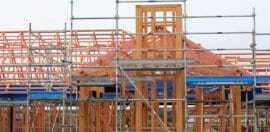Housing all Australians – a new paradigm

9 September 2020 at 5:25 pm
In a new 12-part series, Rob Pradolin attempts to explore the role that housing can and should play within Australian society and why it is important to our economy that we house all Australians, rich or poor.
This series intends to draw on a range of perspectives centred around housing and homelessness. We will hear a range of views from business, the not-for-profit sector and hopefully government, as to why they believe housing is an important social and economic building block for Australia’s future prosperity.
Let me start by saying I do not believe that housing is a human right. That is a decision for an entire society to make. And if half the population agrees with that view, there is the other half that doesn’t. This causes dissent and arguments and no conclusion. To get action, we need to achieve a consensus. And to get consensus, we need to ask the right question.
However, while housing may not be a human right, no one can deny that the provision of shelter is a fundamental human need. And without that need being met, we have unintended social and economic consequences that span generations.
Based on learnings over my career, I have come to a clear and unambiguous view that we are leaving a future society with a significant economic and social burden as a consequence of not investing in sufficient public, social and affordable housing. These consequences manifest themselves through the development of mental and physical health issues, family violence, policing, justice and then long-term welfare dependency. We need to invest in initiatives that prevent future social and economic consequences.
There is no silver bullet in solving this housing challenge. That is why, as the convenor of this column series, I am always open to hearing other people’s perspectives as I believe we should always be open to new thoughts and ideas while having ours respectfully challenged. And in doing so, we need to be open to having our collective views evolve. No one has all the answers. And when we live in such a diverse society that is rich in opinions, consensus will always involve a degree of compromise.
I will also be approaching this topic with a commercial lens. Having been a residential property developer for my entire career, I have a reasonable understanding of what drives the market to deliver appropriate housing typologies. The shortfall in public, social and affordable housing is so significant that unless the market is involved with the solution, we will not achieve the scale needed to service the entire population and prevent the long-term consequences mentioned above. But there needs to be compromises. The housing needs to be funded.
The coronavirus pandemic has made us all realise that we are equal and all vulnerable to this invisible enemy that has declared war on humanity. The virus does not discriminate. Whether you are black or white, rich or poor, if you are exposed, you get infected.
To their credit, all our governments have reacted quickly and even the homeless that were inhabiting our streets were housed. The business community also responded with Quest Apartment Hotels, through the Salvation Army, offering access to their serviced apartments at 140 locations, nationally, at cost. No profit. The Master Builders and the Unions issued a joint press release encouraging the creation of jobs through the construction of more social housing. This is a time where ideological differences need to be put aside so we can all work through this crisis together.
On the topic of homelessness, we have all heard that governments around the country are saying that we should not return to seeing homeless people on our streets. That sounds sensible but that means we need to build more housing and that does not happen overnight. So, what is the plan?
As a society we have to face the facts – there is a current chronic failure that results in people being out in the cold, being vulnerable and isolated. The reality is, when an individual faces challenges in their life that tests their purpose of being.
Without a safe place to gather your thoughts and without people around you that care about your wellbeing, those dreams and possibilities have nowhere to go. You become lonely and isolated. Without a stable and safe place to call home, how can an individual form a productive life? How can they work, study or raise a family properly? To continually fund the services needed becomes a very expensive burden for society as a whole. People need to be housed. Whether they are rich or poor.
So, we hope the series will result in different perspectives being presented and potential new solutions emerging. Nothing significant has been done for decades and doing nothing now is not an option. We need to act and we need to act now.
All of us need to be part of the solution so please feel free to write to me with your thoughts: info@housingallaustralians.org.au
About Housing All Australians
A private sector for-purpose organisation that believes it is in Australia’s long-term economic interest to provide housing for all its people; rich or poor. It was established to facilitate a private sector voice and to reposition the discussion with an economic lens. It advocates that the provision of housing for all Australians is economic infrastructure, just as the provision of roads, schools and hospitals.









Thanks for this discussion – I look forward to seeing the topics you cover. I would be particularly interested in your views on research demonstrating that housing unaffordability is driven by policy settings rather than a shortage of stock. A 2017 ANU paper reported that ‘with the exception of a small shortage in Tasmania, all states have a housing surplus’ resulting in a national ‘oversupply of 164,000 dwellings’*. What does this tell us about the relationship between policy settings and housing affordability? Who are the winners and losers from these policy settings? How might they be adjusted to provide more Australians with affordable, secure housing in well-serviced areas with the opportunities they value?
*https://csrm.cass.anu.edu.au/sites/default/files/docs/2018/12/CSRM_WP1_2017_HOUSING_SUPPLY.pdf
My email to info@housingallaustralians.com.au bounced. There is no website at housingallaustralians.com.au and WhoIs lists the domain as not to be renewed. Is this real fake news?
Dear Michael, Thank you very much for your comment. I apologise that is a mistake. The email should be info@housingallaustralians.org.au and the website is https://housingallaustralians.org.au/. I will correct this now. Best wishes, Wendy